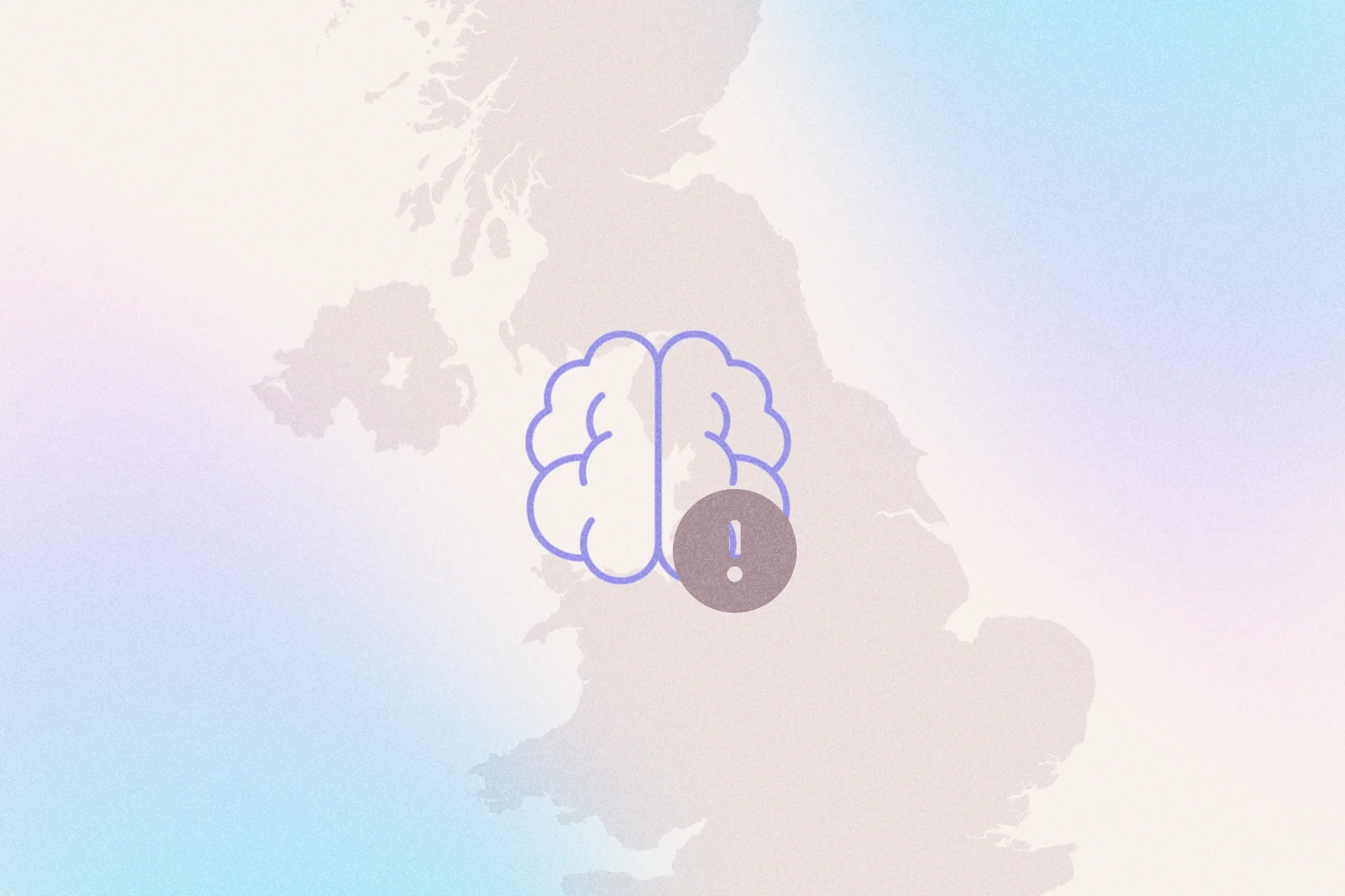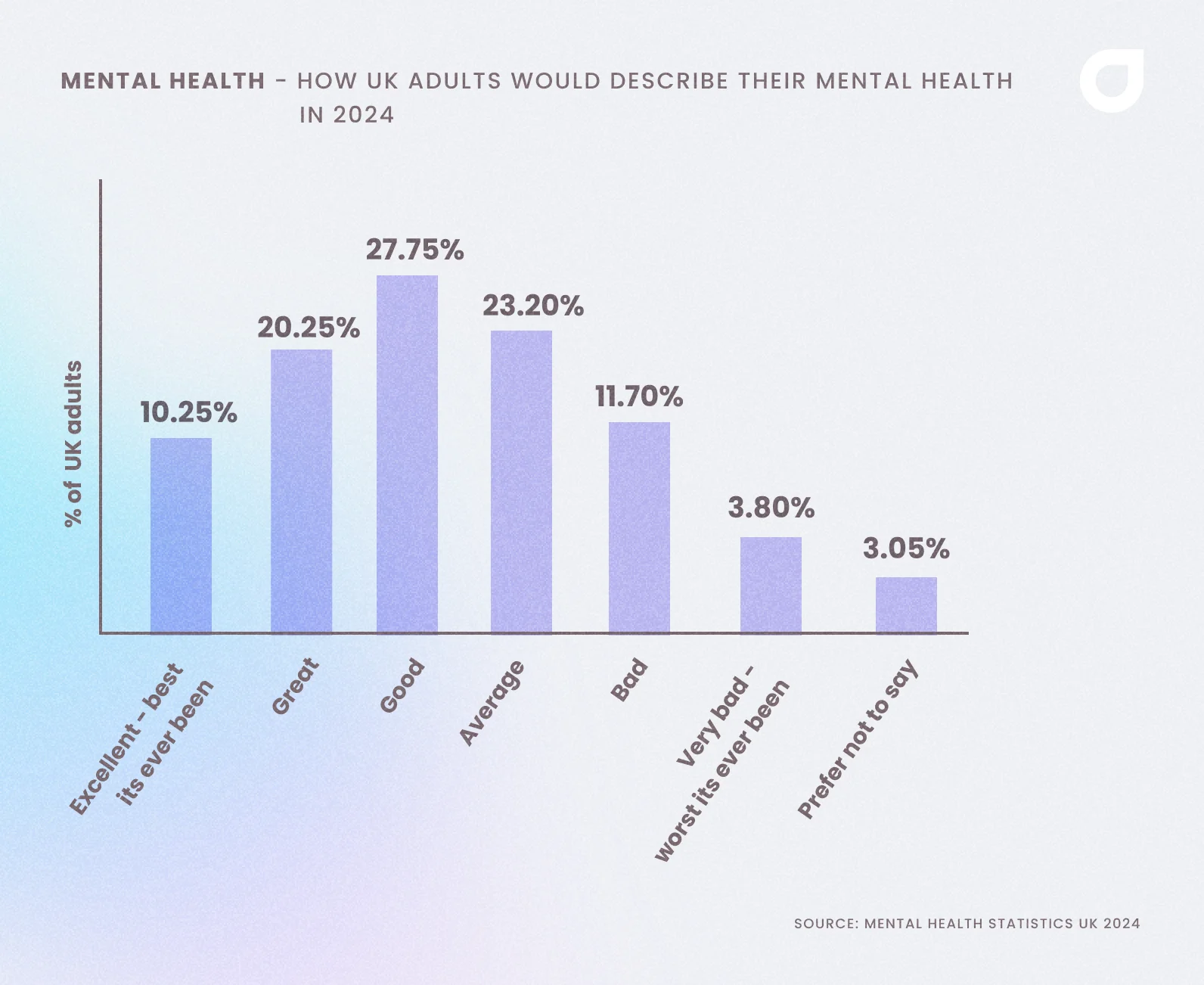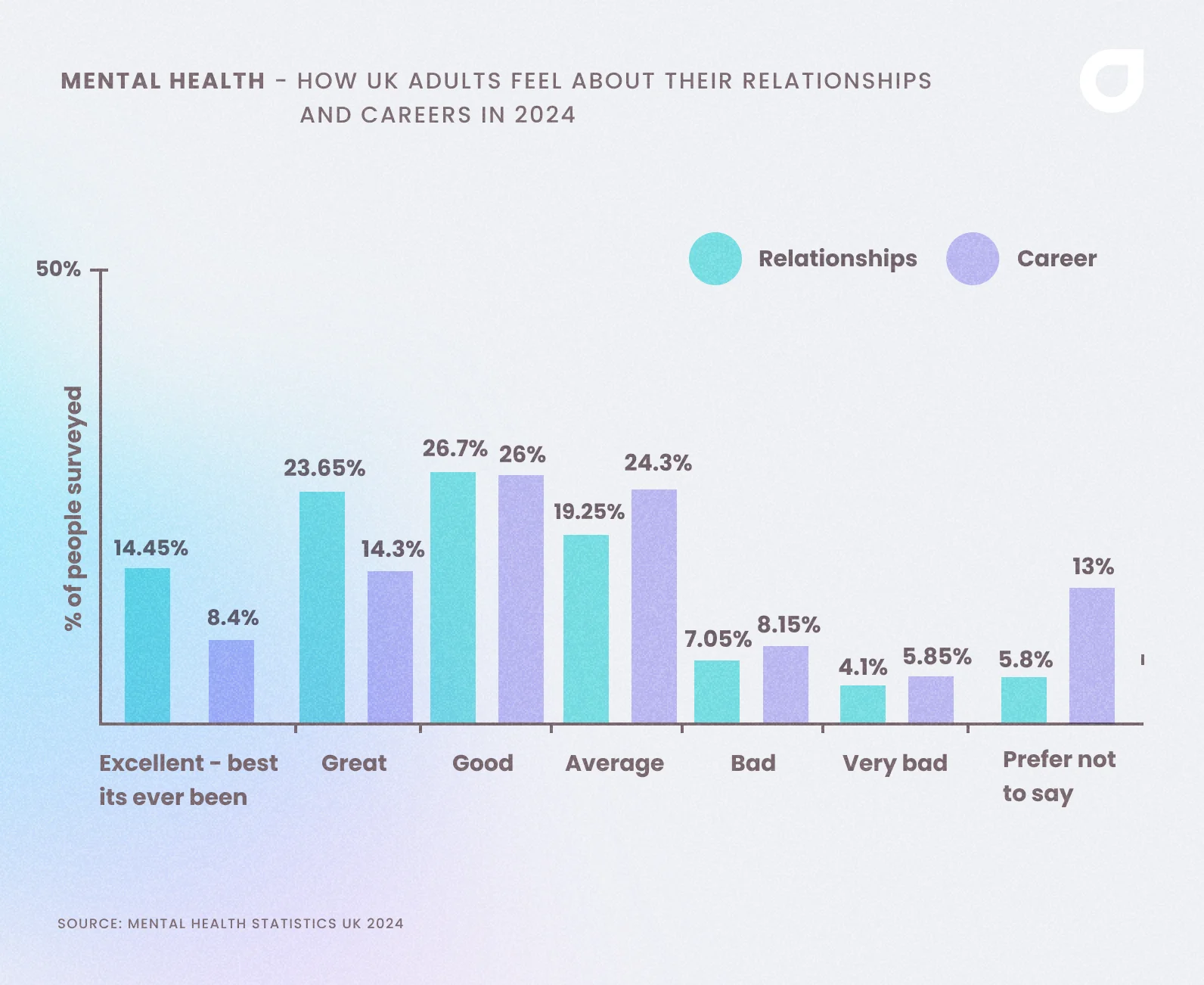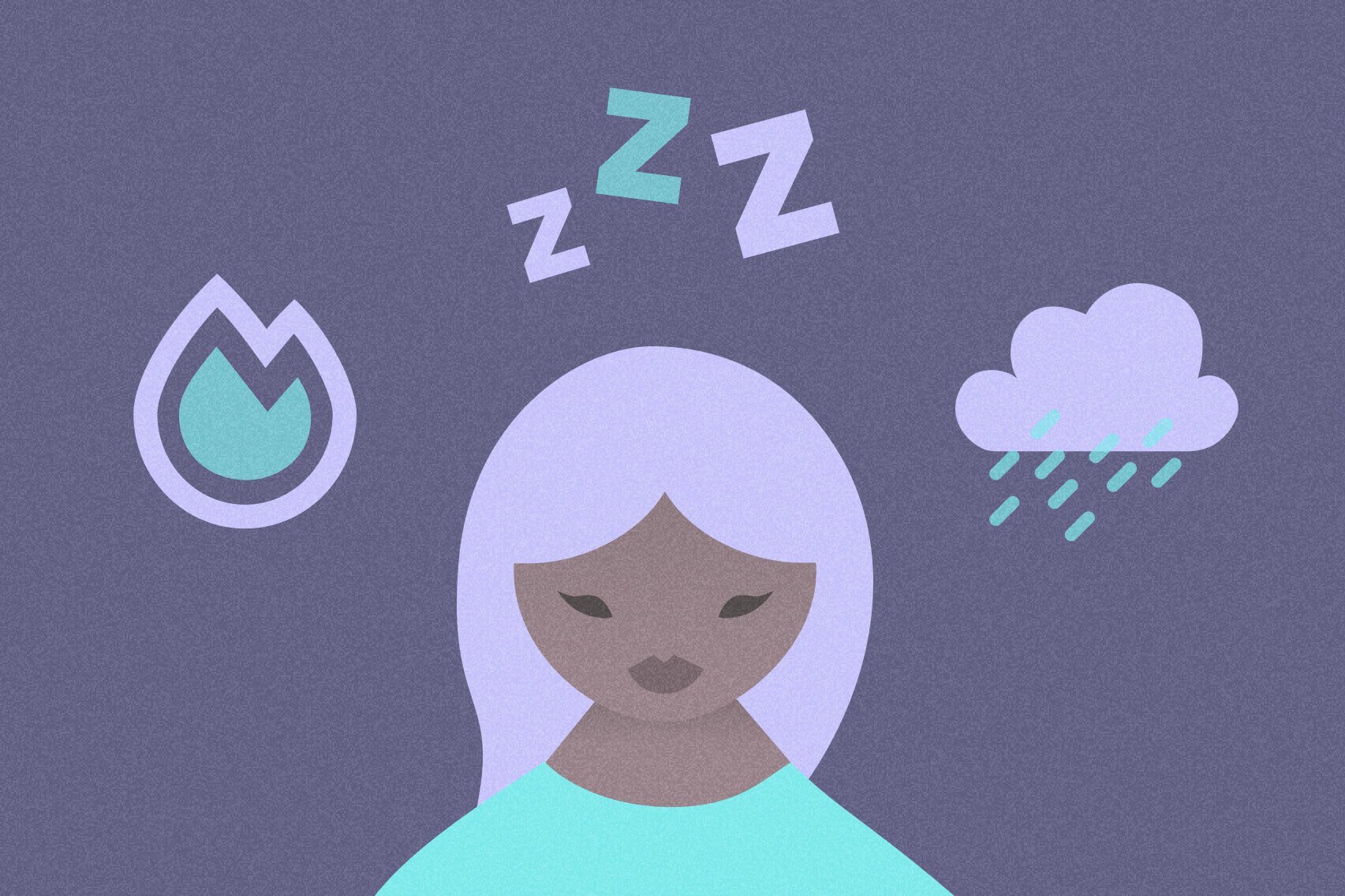12 mins read
Mental Health Statistics UK 2024

As health and wellbeing specialists, we’re acutely aware of the impact mental health difficulties can have on the day-to-day lives of those affected. But exactly how much do these issues affect Brits in 2024? And how do UK adults currently feel about the state of their mental health, relationships and careers?
To find out, we polled a nationally representative sample of 2,000 UK adults, analysed prescription data for issues related to depression and anxiety, and examined Google search volumes of terms surrounding the topic.
Mental Health Statistics: A Summary
Here’s a quick recap of our main findings, facts and figures on the topic of mental health in 2024:
- More than 1 in 7 UK adults say their mental health is currently either bad, or the worst it’s ever been.
- More women than men are currently struggling with poor mental health (18.5% of women vs 12.5% of men).
- Young people, aged 16-24 are the most affected by mental health struggles, with nearly a quarter (23.5%) describing their mental health as either bad or the worst it’s ever been.
- In 2023, NHS England spent £217.5 million on medication to treat depression and anxiety.
- Total NHS spend on medications used to treat anxiety and depression was highest at the start of the pandemic, though, with the total spend for 2020 being £346.4 million.
- More antidepressants and anti-anxiety medication are dispensed in the North East and North Cumbria than any other part of England.
- In the UK in 2024, the term ‘How to reduce stress’ is searched on Google once every 10 minutes, on average.
What percentage of UK adults struggle with their mental health?
From broader issues like depression and stress, to more specific diagnoses, such as PTSD and Seasonal Affective Disorder (SAD), mental health issues can manifest themselves in a wide range of ways, impacting individuals both emotionally and physically. But just how much are UK adults affected by aspects of their mental health in 2024? And how do people feel about their current well-being, relationships and careers?
To find out, we used the market research company Censuswide to poll a demographically representative sample of 2,000 UK adults in January 2024, asking:
How would you describe the following aspects of your life at this time?
- Mental health
- Relationships
- Career
And provided them with the following options for each:
- Excellent – best it’s ever been
- Great
- Good
- Average
- Bad
- Very bad – worst it’s ever been
- Prefer not to say

As you can see from the chart above, the results revealed that:
- Over 1 in 7 (15.5%) say their mental health is currently either bad, or the worst it’s ever been.
- 23% describe their mental health as average, whilst 28% say theirs is currently good.
- 20% say their mental health is great. While another 10% say theirs is excellent, and the best it’s ever been.
How do UK adults feel about their relationships and careers in 2024?
Relationships and careers are among the most common contributing factors for stress, anxiety and feelings of low mood. They’re also some of the first aspects of our lives to be affected by problems with our mental health and wellbeing, so it’s really important that we check in with how we feel in relation to these aspects of our lives.
That’s why we asked our respondents how they feel about their careers and relationships, and found that when it comes to relationships:
- Over 11% of adults say their relationships are currently either bad or the worst they’ve ever been.
- 49% classify their relationships as being great or good.
- 19% say they’re average.
- And 14.5% say their relationships are excellent, the best they’ve ever been.
In terms of careers:
- 14% say their careers are either bad or very bad, the worst they’ve ever been.
- 40% would describe their jobs as good or great.
- 24% feel neutral when it comes to their careers, describing their feelings towards them as average.
- And just 8.5% describe their work life as excellent.

Mental health and gender in 2024: How does women's mental health compare to men’s?
It’s clear that many of us struggle with difficulties with our mental health in 2024, but how does this differ between men and women? Research shows that men are far more likely than women to take their own lives. So does this mean a higher proportion of men suffer from poor mental wellbeing?
To find out, we took a look at the gender breakdown of our survey’s participants, which revealed:
- More women say they struggle with poor mental health than men, with 18.5% of women stating that their mental health is currently either bad or the worst it’s ever been, compared to 12.5% of men.
- Men are nearly twice as likely to describe their mental health as being ‘excellent’ (13.5% of men vs 7.5% of women).
- Similar trends can be seen when it comes to feelings towards our relationships and careers, with far more women than men saying these aspects of their lives are negative.
What’s incredibly important to note here is that the nature of our questioning asks people to rate their own mental health. So the responses will be subjective and based on their own experience of their own mental health.
For someone with no history of mental health concerns, a persistent but even slight low mood may still constitute their mental health being the worst it has ever been. But for someone with a history of depression, for example, the same low mood might have them rating their own mental health as good.
We think it’s important to acknowledge this and we feel that how people perceive their own mental health is as important as any academic scale. After all, mental health is by its very nature about how we feel.
Here are the breakdowns by gender.
| Career | Male | Female |
|---|---|---|
| Excellent – best it’s ever been | 10.57% | 6.38% |
| Great | 15.23% | 13.43% |
| Good | 25.39% | 26.57% |
| Average | 24.25% | 24.35% |
| Bad | 7.25% | 8.99% |
| Very bad – worst it’s ever been | 5.91% | 5.80% |
| Prefer not to say | 11.40% | 14.49% |
| Relationships | Male | Female |
|---|---|---|
| Excellent – best it’s ever been | 14.72% | 14.20% |
| Great | 23.52% | 21.84% |
| Good | 27.77% | 25.70% |
| Average | 18.45% | 20.00% |
| Bad | 7.36% | 6.76% |
| Very bad – worst it’s ever been | 3.42% | 4.73% |
| Prefer not to say | 4.77% | 6.76% |
Stigma Around Mental Health for Men and Women
While men are likelier to rate their mental health positively than women are, men continue to account for three-quarters of suicides in the UK.It continues to be difficult in many cases for both men and women to talk about their mental health concerns. But finding it more difficult to talk about their mental well-being is something that affects men more than women. This is often attributed to the fact that the traditional gender roles of men expect them to be strong and stoic.
Age and mental health in the UK
Who’s more likely to suffer from poor mental health? Is it the older members of society, who are perhaps more likely to experience loneliness or grief? Or is it younger members of society, dealing with workplace stresses and navigating the world of relationships for the first time?
To find out, we asked all of our participants to disclose their age and analysed the results to look for any correlations. Our analysis found that:
- Young people, aged 16-24, are by far the most likely to say they experience mental health struggles, with nearly a quarter (23.5%) describing their mental health as either bad or the worst it’s ever been.
- This is followed by 45-54-year-olds, 17.5% of whom say they’re currently experiencing either bad or very bad mental health.
- The most positive when it comes to their mental health, though, are 25-34-year-olds, with more people in this age category describing their current mental state as being excellent and the best it’s ever been.
| Mental Health | 16-24 | 25-34 | 35-44 | 45-54 | 55+ |
|---|---|---|---|---|---|
| Excellent – best it’s ever been | 10.47% | 15.06% | 6.92% | 10.12% | 9.53% |
| Great | 15.50% | 21.08% | 17.61% | 15.95% | 24.41% |
| Good | 23.64% | 28.61% | 28.62% | 26.69% | 28.85% |
| Average | 23.64% | 19.58% | 26.73% | 25.46% | 22.19% |
| Bad | 17.83% | 9.94% | 11.32% | 13.19% | 9.92% |
| Very bad – worst it’s ever been | 5.43% | 3.92% | 5.03% | 4.29% | 2.48% |
| Prefer not to say | 3.49% | 1.81% | 3.77% | 4.29% | 2.61% |
How often are antidepressants and anti-anxiety medications prescribed in the UK?
Sometimes, talking therapy and lifestyle changes are simply not enough to help improve the lives of those living with depression or anxiety disorders, and that’s when medication can come in. Whether it’s groups of drugs such as benzodiazepines, designed to reduce cortisol (stress) levels in the blood, SSRIs that are designed to increase levels of serotonin in the brain, or other medications commonly used to treat mental health issues, these drugs can play a crucial role in improving quality of life.
But which parts of the country are prescribed the most drugs to treat mental health problems? How much is the NHS spending on antidepressant and anti-anxiety medication? And are we prescribing more or less of these drugs now than we were 5 years ago?
To find out, we analysed NHS England prescription data from OpenPrescribing.net, looking specifically at the number and costs of antidepressants and anxiolytics (anti-anxiety medications) prescribed over the last 5 years. Our analysis found:
- In 2023 alone, NHS England spent £217.5 million on medication to treat depression and anxiety.
- In 2022, more antidepressants and anxiolytics were prescribed than in any other year between 2019-2023.
- Total NHS spend on medications used to treat anxiety and depression was highest at the start of the pandemic, though, with the total spend for 2020 being £346.4 million.
Which parts of the UK have the highest rates of prescriptions for depression and anxiety medication?
Although vital, medications used to treat mental health problems such as anxiety and depression come at a huge cost to the NHS. But in which parts of the country do these medications get prescribed most frequently?
To find out, we weighted the number of antidepressant and anxiolytic items prescribed in each ICB (Integrated Care Board) in England over the last 5 years, with population data for each area. This enabled us to determine the number of items prescribed per 1,000 in each ICB in England.
- More antidepressant and anti-anxiety medication is dispensed in the North East and North Cumbria than any other part of England.
- This is followed by Lincolnshire and Norfolk and Waveney, which have the second and third highest rates in England.
| Rank | ICB | Antidepressants and Anxiolytic items prescribed in 2023, by 1,000 people |
|---|---|---|
| 1 | North East and North Cumbria | 206 |
| 2 | Lincolnshire | 186 |
| 3 | Norfolk and Waveney | 181 |
| 4 | Suffolk and North East Essex | 174 |
| 5 | South Yorkshire | 173 |
| 6 | Cornwall and the Isles of Scilly | 165 |
| 7 | Cheshire and Merseyside | 165 |
| 8 | Lancashire and South Cumbria | 154 |
| 9 | Humber and North Yorkshire | 149 |
| 10 | Gloucestershire | 149 |
| 11 | Greater Manchester | 147 |
| 12 | Devon | 147 |
| 13 | Northamptonshire | 145 |
| 14 | Derby and Derbyshire | 143 |
| 15 | Staffordshire and Stoke-on-Trent | 143 |
| 16 | Nottingham and Nottinghamshire | 137 |
| 17 | Dorset | 136 |
| 18 | Herefordshire and Worcestershire | 134 |
| 19 | Cambridgeshire and Peterborough | 134 |
| 20 | West Yorkshire | 133 |
How common are mental health struggles in the UK in 2024?
Even with surveys and prescription data, the number of people affected by mental health problems is not so easy to determine. From stigmas surrounding mental health conditions causing people to be less open about their struggles, to individuals being unaware that the problems they’re facing are related to mental health issues.
That’s why we did what anyone does when they’re looking for advice, and turned to Google. Of course, this can’t tell us exactly how many people are affected by certain illnesses, but it can give us a really good indication of how many people are struggling with symptoms related to mental health, and reaching out for advice and support.
To conduct our analysis, we used the search analysis tool Keyword Finder. This allowed us to discover search volumes for commonly-searched terms related to mental health in the UK. Our analysis found:
- In the UK in 2024, someone searches for ‘How to reduce stress’ every 10 minutes, on average.
- An average of 7,100 searches are conducted every month for ‘anxiety treatment’.
- And 12,100 searches are made for ‘mental health helpline’.
Many people also search for the symptoms of common mental health disorders, likely trying to see if their symptoms align with them. Some of the most common searches, alongside their average monthly search volumes, include:
- Anxiety symptoms (74,000 searches per month)
- Depression symptoms (49,500 searches per month)
- Bipolar symptoms (38,000 searches per month)
- PTSD symptoms (33,500 searches per month)
- SAD mood disorder (29,100 searches per month)
- OCD symptoms (23,800 searches per month)
- PMDD symptoms (19.100 searches per month)
- Schizophrenia symptoms (18,100 searches per month)
- Stress symptoms (15,900 searches per month)
- Borderline Personality Disorder symptoms (12,100 searches per month)
As well as people searching for ways to help themselves, many of us also search for advice on helping someone we know who’s struggling with their mental health. For instance:
- Each month in the UK, 6,600 searches are conducted for ‘how to help someone with depression’. That’s an average of one search every 7 minutes!
- The term ‘Living with someone who has depression’ is also searched 770 times per month, on average.
Women’s mental health statistics
Our previous studies on the topics of menopause in the workplace and perimenopause also revealed some insightful information on how menopause affects women’s mental health.
- For instance, almost half of menopausal women have experienced low mood at work.
- Despite this, 90% said their employers offer no support in terms of the menopause.
- Our study into perimenopause also found that 87% of 30 and 49 year-olds have experienced mood changes, and another 79% have struggled with poor sleep.
- Referring back to your perimenopause piece to reference the impact of this on women’s mental health too
What can be done?
Reaching out for help is the first step to positive change. Whether you’re facing personal challenges, navigating a difficult situation, or trying to help someone you know with mental health difficulties. By reaching out to friends, family, or professional resources, you open the door to understanding, empathy, and potential solutions.
Listed below are the contact details of some of the UK’s leading mental health support organisations. You can also contact your GP anytime to ask for advice and support.
Samaritans:
- Phone: 116 123 (free, available 24/7)
- Website: Samaritans
Mind Infoline:
- Phone: 0300 123 3393 (Monday to Friday, 9 am to 6 pm)
- Email: [email protected]
- Text: 86463
- Website: Mind
Rethink Mental Illness:
- Phone: 0808 801 0525 (Monday to Friday, 9.30 am to 4 pm)
- Email: [email protected]
- Website: Rethink Mental Illness
CALM (Campaign Against Living Miserably):
- Phone: 0800 58 58 58 (available 5 pm to midnight every day)
- Website: CALM
YoungMinds:
- Phone (Parents’ Helpline): 0808 802 5544 (Monday to Friday, 9.30 am to 4 pm)
- Text (YoungMinds Crisis Messenger): Text “YM” to 85258
- Website: YoungMinds
This information has been medically reviewed by Dr Thom Phillips
Thom works in NHS general practice and has a decade of experience working in both male and female elite sport. He has a background in exercise physiology and has published research into fatigue biomarkers.

Dr Thom Phillips
Head of Clinical Services
Related articles
Like this article? Here are some more based on similar topics.



